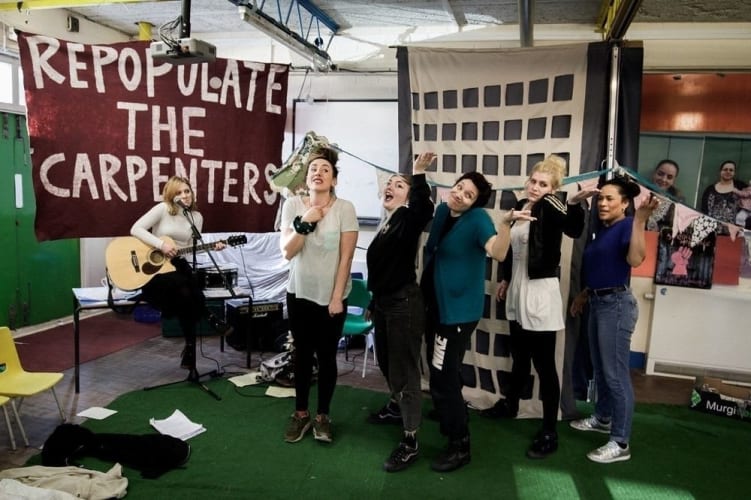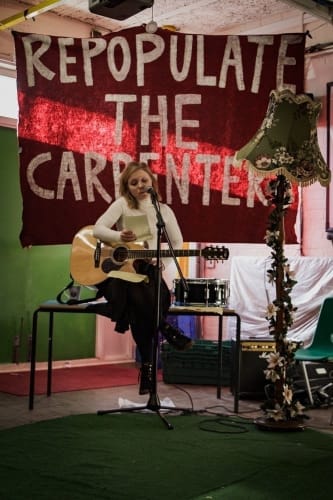If all political protest was as much fun as it is depicted in the play Land of the Three Towers then it could easily become everyone’s favourite activity.
The show is a very entertaining, often humorous celebration of the housing struggles of the E15 mothers and the occupation that took place on Newham’s Carpenters Estate in Stratford. It is performed by seven assured performers who have an eye and an ear for things that will raise our spirits.
In the unlikely event that the play itself is not enough for you, they also insert an open mike interval in which the night I attended there was a poem about the closure of Kids Company and a song from the American Civil Rights struggle.
We arrive to a performance space festooned with colourful banners bearing slogans such as "Social Housing Not Social Cleansing". Pegged to washing lines are children’s drawings. In the corner of the room, women from the cast softly sing an uplifting medley of the show's songs to a single guitar.
Drawing on the actual words of housing activists and those caught in Newham’s housing disaster, the show tells the story of events which became an inspiration across the country.
We meet Mary Finch (Lotte Rice), a resident of the Carpenters Estate for forty-two years. She sits in her long pink dressing gown on a huge comfy chair describing the excitement of first moving into the place she calls home and her determination not to be forced out.
The estate, built in 1967, is known as the land of the three towers and over the years was being gradually emptied by the Council. Good houses were being boarded up despite Newham’s desperate housing shortage.
That situation was to change when Newham withdrew its funding for the E15 hostel, offering its soon to be evicted tenants nothing better than being transferred from an area they had lived all their lives to Manchester, Hastings or Birmingham. It led to accusations of social cleansing and, in response, a series of protests including the occupation of a house on the Carpenters Estate which was turned into a community centre.
Newham Council fought back by smashing the water supply and taking legal action. But by then the protest had become a magnet for people who feared London was trying to clear its poor to make way for rich property investors.
They marched, they conducted a media campaign and they lobbied politicians including Boris Johnson, Mayor of London, who we are told had previously stated his opposition to "Kosova style" social cleansing of London. However after waiting in the freezing cold for hours, they were allowed one question at a public meeting.and were told by Boris that the issue had nothing to do with the London Mayor.
The final deal activists struck with Newham Council gave some people homes on the Carpenters Estate but it wasn’t all that should have happened, and in a moving scene where they describe it to Mary you can see their disappointment, especially when she asks, "where has this country gone?"
It is one of the few sombre moments in an uplifting performance that is constantly finding imaginative ways of presenting its story. Mary’s first speech is underscored by the a cappela harmonies of a group of young women standing round her chair. There is a good deal of warm a cappela underscoring and a whole series of gentle folk blues songs throughout the show. Many of them are deliberately amusing both in style of delivery and content.
Humour figures strongly in the show with the fight to retain the occupation recreated dramatically in some very funny scenes. It was also very difficult to take seriously the letter about the conflict by Newham’s Mayor Robin Wales when it was spoken hilariously by a sock puppet in an empty suit.
By the end of this very enjoyable show, many of the audience must have felt cheered and inspired. However, the cast conclude by sounding a note of alarm as they tell us that across London 174,000 residents face eviction and some 30,000 homes face demolition. It is why this play is more than just a good night out.
The show is also being performed on the Silchester Estate (Kensington) 25 and 26 October and the Cressingham Gardens Estate (Brixton) 27 and 28 October.


